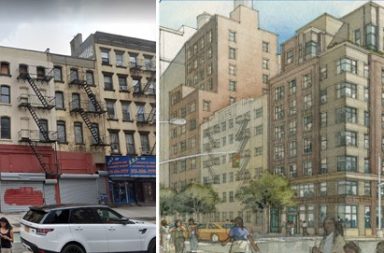Jamaica is getting a ginormous Burlington Coat Factory.
Burlington will have 70,000 square feet of the 150,000-square-foot retail redevelopment now planned for three buildings along the major shopping area of Jamaica Avenue in Queens between Union Hall Boulevard and 160th Street.
Developer United American Land will integrate the landmarked 161-02 Jamaica Ave. with 160-16 Jamaica, which will be shortened from nine stories to four stories and be given a new façade; and 160-08 Jamaica, which will retain its existing façade. All three buildings will be interconnected and have seamless floor plates.
Burlington will have half of the second floor and the entire third and fourth floors of the four-story project designed by GreenbergFarrow.
“The announcement of Burlington as the first tenant of our 150,000-square-foot project is an exciting first step, with other premier tenants to follow,” said Albert Laboz, principal of United American Land, which had an asking rent of $55 per square foot.
Burlington was represented by Clifford Simon of CNS Real Estate, while UAL represented itself.
The retail tenants should be open for business during the spring of 2017.
Sources tell me “Stomp” will be banging its drums, sticks, cans and what have you at the Orpheum Theater on Second Avenue at least through the fall, while arbitration takes place with its Reading International theater owners.
“Stomp” had been prepared to move to a different space due to what it claimed were maintenance issues, but would be facing hefty fines under its license agreement if it didn’t go through the arbitration process, which is now scheduled for later this year.
The Legionnaires’ outbreak has many Bronx residents scared and building owners all over the city scurrying to test systems even as the state and city scramble to impose legislative requirements that will encompass buildings, both in the city and then statewide, through executive order.
There are many more boilers than cooling towers as these are more sophisticated systems, but chillers are also used in many places of public assembly, including hospitals, hotels and large office buildings, so that outbreaks can be spread to large numbers of people.
John Banks, president of the Real Estate Board of New York, said in a statement, “Cooling towers are complicated systems which require regular maintenance, and testing is part of an ongoing protocol. Legionnaires’ disease is a serious issue and building owners we’ve spoken to are responding appropriately. REBNY supports an effective and efficient system of registering, inspecting and, when necessary, treating cooling towers.”
But the city has over a million buildings, and each year numerous property owners neglect to file annual inspection reports for their boilers or even their once-every-five-year reports for façades. There are also buildings that are yet to file energy benchmarking reports.
Other reports and notices are required with regard to lead paint, window guards, fire alarms and CO2 alarms. Missing any of these can result in violations, fines and, in the worst scenarios, deaths.
Then there are multiple dwellings that don’t file annual registrations with Housing Preservation & Development. These now include the building at 121 Second Ave., where an allegedly illegal gas line installation likely caused the explosion that killed two men and injured dozens, including the owner’s son.
The three buildings, including No. 121, that were damaged as a result of the explosion were each charged $351,625 for emergency demolition. No. 121 also owes $24,370.84 in property taxes and $497.65 in interest.
The neighboring 119 Second Ave. is owned by the same family as No. 121, and owes the $351,625 for emergency repairs along with $2,165.84 for water, including a $40 late fee, plus a property registration fee of $30 and a $10 rent stabilization fee. The taxes of $82,773.34 were paid, likely by a mortgage servicing company.
No. 123 Second Ave. is owned by another individual and was also demolished due to the explosion and charged $351,625. Its taxes of $17,513 were paid, as was the multiple dwelling registration fee. The boiler was regularly inspected and a violation that was a result of the explosion was dismissed in May.
The city layers on requirements but does not have nearly enough inspectors to ensure regulations are followed, permits are filed, and work is legally completed. While the various building-owner organizations try to educate both the public and their own members, there are always those that are overwhelmed by the costs and the sheer amount of paperwork, or simply don’t care.
Adding what the Department of Buildings estimates is “thousands” of cooling towers to the myriad list of items to be registered with the city and state is only extraordinary in that it was not already required, but it won’t mean the city or state will be any safer when there are not enough officials to follow up.









